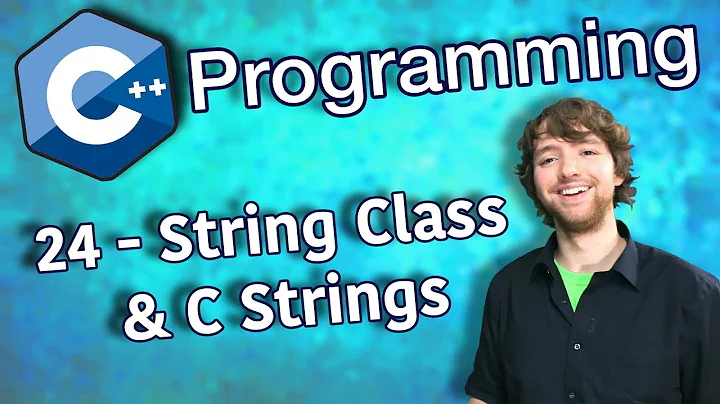Converting a C-style string to a C++ std::string
Solution 1
C++ strings have a constructor that lets you construct a std::string directly from a C-style string:
const char* myStr = "This is a C string!";
std::string myCppString = myStr;
Or, alternatively:
std::string myCppString = "This is a C string!";
As @TrevorHickey notes in the comments, be careful to make sure that the pointer you're initializing the std::string with isn't a null pointer. If it is, the above code leads to undefined behavior. Then again, if you have a null pointer, one could argue that you don't even have a string at all. :-)
Solution 2
Check the different constructors of the string class: documentation You maybe interested in:
//string(char* s)
std::string str(cstring);
And:
//string(char* s, size_t n)
std::string str(cstring, len_str);
Solution 3
C++11: Overload a string literal operator
std::string operator ""_s(const char * str, std::size_t len) {
return std::string(str, len);
}
auto s1 = "abc\0\0def"; // C style string
auto s2 = "abc\0\0def"_s; // C++ style std::string
C++14: Use the operator from std::string_literals namespace
using namespace std::string_literals;
auto s3 = "abc\0\0def"s; // is a std::string
Solution 4
If you mean char* to std::string, you can use the constructor.
char* a;
std::string s(a);
Or if the string s already exist, simply write this:
s=std::string(a);
Solution 5
You can initialise a std::string directly from a c-string:
std::string s = "i am a c string";
std::string t = std::string("i am one too");
Related videos on Youtube
Ian Burris
Updated on July 09, 2022Comments
-
Ian Burris almost 2 years
What is the best way to convert a C-style string to a C++
std::string? In the past I've done it usingstringstreams. Is there a better way?-
Rob Kennedy over 13 yearsWhat's a cstring? Do you mean a
CStringfrom MFC? Or a null-terminated array of char (a C string)? Or something else?
-
-
Barney Szabolcs over 8 yearsand now I also have to do
delete myStr;no? -
templatetypedef over 8 years@BarnabasSzabolcs No, that's not necessary. You only need to delete memory allocated with new. Pointers to string literals don't need to be deallocated.
-
Barney Szabolcs over 8 yearsI see, so I'm guessing right, string makes an internal copy of this char *.
-
templatetypedef over 8 years@BarnabasSzabolcs Yes, though that's independent of whether you need to deallocate the original string.
-
 Trevor Hickey over 8 yearsEvery answer here fails to mention the obvious edge case. If your char* is NULL, std::string will throw. It will not be an empty string as many would suspect. It's unfortunate that all the top posts on stackoverflow don't mention this, and I suspect many people who google for this simple conversion are dealing with the bugs later.
Trevor Hickey over 8 yearsEvery answer here fails to mention the obvious edge case. If your char* is NULL, std::string will throw. It will not be an empty string as many would suspect. It's unfortunate that all the top posts on stackoverflow don't mention this, and I suspect many people who google for this simple conversion are dealing with the bugs later. -
 Trevor Hickey over 8 yearsNo. Your example would throw a logic error in std::string's constructor. 'a' cannot be NULL.
Trevor Hickey over 8 yearsNo. Your example would throw a logic error in std::string's constructor. 'a' cannot be NULL. -
templatetypedef over 8 years@TrevorHickey While that's true, one could argue that NULL isn't a string. It's the absence of a string.
-
 Trevor Hickey over 8 years@templatetypedef Agreed. The answers here aren't wrong, but a disclaimer about NULL would go a long way in terms of helping others. There are many common functions("getenv()" for example), that may or may not return NULL when called with the same inputs. By giving newcomers a simple one-liner without adding a disclaimer is setting them up for failure.
Trevor Hickey over 8 years@templatetypedef Agreed. The answers here aren't wrong, but a disclaimer about NULL would go a long way in terms of helping others. There are many common functions("getenv()" for example), that may or may not return NULL when called with the same inputs. By giving newcomers a simple one-liner without adding a disclaimer is setting them up for failure. -
Bogatyr over 7 years@templatetypedef Yep, it was precisely a std::string s(getenv(foo)) throwing when the env didn't exist that led me here. It's sort of clunky that you can't initialize a string to a null value and have the string remain empty.
-
Vallerious about 2 yearsa variable that is NULL or nullptr still has a type in statically-typed languages, so I do not think it is correct for std::string to throw or go into undefined behavior when given null. It should ideally initialise empty string.





